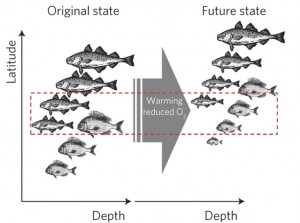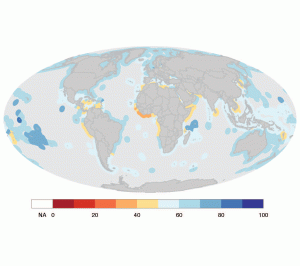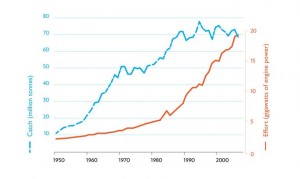 A new study led by Sea Around Us Project member William Cheung shows that changes in ocean and climate systems could lead to smaller fish.
A new study led by Sea Around Us Project member William Cheung shows that changes in ocean and climate systems could lead to smaller fish.
Find out more in the press release and the paper published in Nature Climate Change.
 A new study led by Sea Around Us Project member William Cheung shows that changes in ocean and climate systems could lead to smaller fish.
A new study led by Sea Around Us Project member William Cheung shows that changes in ocean and climate systems could lead to smaller fish.
Find out more in the press release and the paper published in Nature Climate Change.
A new website (www.fishingdown.org), hosted by the Sea Around Us Project, has been launched. This website helps clear up misconceptions about the concept of “fishing down” in marine ecosystems – whereby fisheries have a tendency to deplete longer lived, high-trophic level species first, causing a decline in the mean trophic level of catches from an ecosystem.
Since it was first published, the fishing down concept has been documented and adopted by a broad community of marine and freshwater scientists around the world. Thus, the website also aggregates many case studies illustrating the phenomenon in marine ecosystems all over world, from Argentina to the North Sea, from Greece to the Caribbean. In 2010, the fishing down concept was challenged in a publication in the journal Nature. The objections that were raised are based mainly on imputations and misunderstandings, and the Fishing Down website is dedicated to clearing up the misunderstandings behind much of the controversy. One apparent problem is that fishing down can be masked by extraneous factors, such as the taxonomic over-aggregation of catch statistics. The website is intended as a response to the voiced concerns and provides scientific references about the fishing down phenomenon, including a link to the original article, led by biologist Daniel Pauly and published in the journal Science in 1998, titled “Fishing down marine food webs.”
We welcome you to visit www.fishingdown.org.
by Duncan Copeland and Dyhia Belhabib
Healthy and well-managed marine environments are essential for ensuring food security, reducing poverty and promoting marine conservation in West Africa. Yet the region faces enormous challenges in achieving these goals, not least of which are poor or even non-existent data relating to fisheries, biodiversity and the impact of human activities.
The Sea Around Us Project is increasingly focusing on data-deficient regions of the oceans, particularly in the developing world. West Africa has been highlighted as a priority region, and in the past few months, the “Sea Around Us Project and PRCM: Marine Conservation Research, Collaboration and Support in West Africa” has been launched. Funded by the MAVA Foundation, the project will address the serious deficiency of adequate data in areas such as capture fisheries and biodiversity at the local, national and Large Marine Ecosystem levels in West Africa.
The Regional Marine and Coastal Conservation Programme for West Africa (PRCM) brings together an important coalition of non-governmental organizations to work with local and regional stakeholders and coordinate efforts to preserve the littoral zone of coastal countries in the region, which includes Mauritania, Senegal, The Gambia, Cape Verde, Guinea-Bissau, Guinea and Sierra Leone. Crucially, the PRCM has promoted cooperation with public sector and civil society organisations to achieve marine conservation, fisheries and integrated management support goals.
However, the challenges facing the success of these initiatives are significant. Limited government capacity and poor regulation; illegal, destructive and over-fishing by industrial fleets; high local dependence on marine resources for livelihoods and food security; and the limited number of marine protected areas in the region all contribute to a difficult environment for achieving effective fisheries and marine conservation. Yet perhaps the greatest impediment to sustainable fisheries management and marine conservation in West Africa is the current deficiency, accessibility and usage of adequate data.
The region has seen limited national and international resources put towards adequate assessments of marine capture fisheries and biodiversity. As a result, decision-making in fisheries management at the local, national and regional levels, as well as in a variety of conservation projects, is often based on limited science. The imperative is to improve the data upon which fisheries management and conservation depends, and ensure that PRCM stakeholders receive support in the utilisation of data within specific marine conservation and fisheries management initiatives.
The Sea Around Us West Africa programme aims to accomplish three complementary objectives, all directly contributing to regional marine conservation, fisheries management and integrated management support objectives. These are to:
• Increase the quality of available data relating to existing and new initiatives promoting marine conservation and fisheries management in West Africa through the development of catch and effort reconstructions.
• Develop strong collaborative relationships between the Sea Around Us Project and proposed project partners; engagement of a wider number of government, research and non-governmental partners will be achieved.
• Raise broader international awareness and support for marine conservation in the region via the publication of peer-reviewed articles and engagement of media.
To achieve these aims, the project is supporting targeted research on catch, effort and catch values, biodiversity, marine protected areas, and other related issues. Crucially, this information will be developed within a partner support framework, ensuring that PRCM member and partner initiatives benefit not only from the generated data, but also have improved organisational expertise to integrate the data into existing and future initiatives. These partners include the Sub-Regional Fisheries Commission (SRFC), local research institutions and the members of the PRCM (WWF, IUCN, Wetlands International and International Foundation for the Banc d’Arguin). Data analysis and visualisation models will be used to achieve these goals in collaboration with PRCM members and other relevant stakeholders.
Through these partnerships, the Sea Around Us Project and PRCM project provides an innovative and supportive approach that will directly contribute to strengthened national, regional and international cooperation in the short and longer term. The programme is specifically designed to offer potential extension beyond the initial proposed two-year period and a model for replication in other regions of the developing world with data-deficient fisheries. In addition, the project will work as much as possible with individuals that are nationals of the target countries, improving expertise in the region.
Marine habitats in West Africa are considered among the most data-deficient globally. With an increased focus on the developing world and growing experience working in the West African region, the Sea Around Us Project is uniquely placed to collaborate with project partners to generate strategic data and support that will directly benefit conservation, fisheries and management goals.

The Ocean Health Index is the first global quantitative assessment of ocean health (Map credit: Halpern, et al, Nature)
The health of the world’s oceans received a score of 60 out of 100 from a team of international scientists, including researchers with the Sea Around Us Project. Kristin Kleisner, Dirk Zeller, Rashid Sumailaand Daniel Pauly were part of the team that undertook the first global quantitative assessment of ocean health and created the Ocean Health Index by evaluating ecological, social, economic and political conditions for every coastal nation in the world.
The Sea Around Us Project in particular was responsible for measuring the amount of seafood that is sustainably generated by fisheries and marine aquaculture for human consumption, which contributed to calculating the score for ocean health.
The article, published in Nature, is available here and the press release is here.
 Global fishing effort — as measured by engine power expended — has increased 10-fold since the 1950s, according to a new paper led by the Sea Around Us Project’s Reg Watson and published in the journal Fish and Fisheries. However, global catches are not managing to keep up the pace. Read more about the findings at Nature and at the Pew Environment Group website.
Global fishing effort — as measured by engine power expended — has increased 10-fold since the 1950s, according to a new paper led by the Sea Around Us Project’s Reg Watson and published in the journal Fish and Fisheries. However, global catches are not managing to keep up the pace. Read more about the findings at Nature and at the Pew Environment Group website.